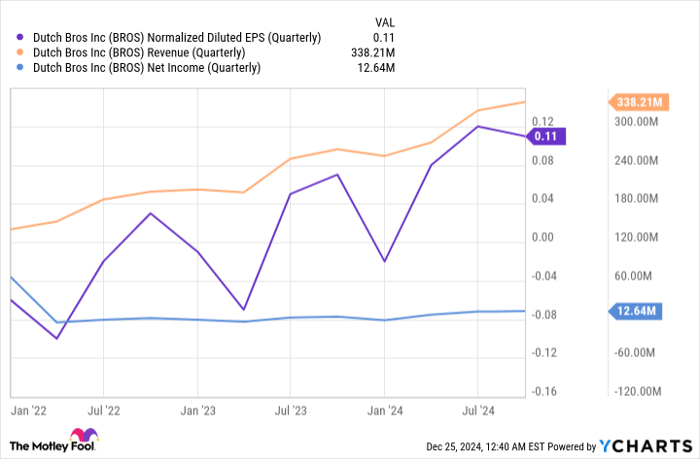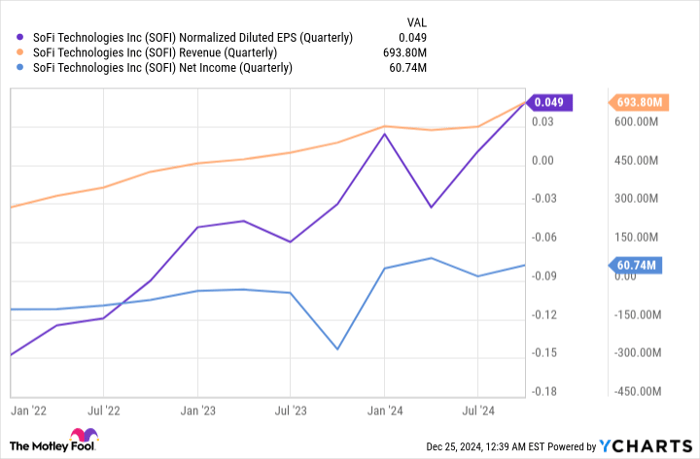As a general rule, investors should own stocks of companies that are smart picks no matter when you buy them or how long you hold them.
Every now and then, though, you'll come across a prospect on the verge of entering a high-growth phase that could drive the underlying stock firmly higher for the next several years. Think Nvidia when the artificial intelligence revolution first took hold nearly a decade ago or Amazon back in the early 2000s. Timing isn't everything, but it's certainly something!
Start Your Mornings Smarter! Wake up with Breakfast news in your inbox every market day. Sign Up For Free »
With that as the backdrop, here's a closer look at three potential monster stocks you may want to consider buying and holding for the next 10 years. Each company seems to be at a pivotal point in its existence, ready to ride a major wave of growth.
In no particular order....
Dutch Bros
Coffee isn't exactly a high-growth business, whether you're talking about beans for home-brewing or serving it in a shop. And to the extent that the prepared coffee (and related specialty drinks) market is set to swell, industry powerhouse Starbucks appears positioned to capture much of this growth.
A subtle but important change is underway within the world of premium coffee drive-thrus, though. As time marches on, the average coffee drinker is less interested in the polished and formal experience offered by Starbucks. Consumers are instead increasingly interested in something a little more casual and informal.
Enter Dutch Bros (NYSE: BROS).
Anyone living in the western corridor of the country has probably seen at least one of its 950 coffee kiosks. And if you've purchased a drink from one, you've likely had an unusually personal conversation with its employees. That's by design; fun and informal feel more authentic to a growing number of consumers.
The company's results say as much anyway. Its third-quarter same-store sales were up 2.7% year over year, marking the seventh consecutive quarter that same-store sales improved. Overall sales were up 28% year over year as well, also extending a well-established trend thanks to the addition of another 38 new locales.
BROS Normalized Diluted EPS (Quarterly) data by YCharts. EPS = earnings per share.
This still only scratches the surface of what awaits, though. Dutch Bros' long-term plans are to establish a total of 4,000 outlets within the next few years. And given its current growth trajectory, there's no reason to think this target is out of reach.
More important to interested investors, the next several years will also be incredibly high-growth. This is very much a right time/right place kind of opportunity.
SoFi Technologies
The same idea applies to online bank SoFi Technologies (NASDAQ: SOFI). That is, newcomers will be plugging into this ticker at a point when the online banking business is on the verge of exploding.
It's not exactly a new idea. Most major banks have offered at least some level of web-based access and online services since the World Wide Web as we know it took shape. However, the business is still evolving. As consumers age and are more likely to be digitally native, expectations for more and better online service rise.
To this end, Straits Research believes the global online banking market is set to grow at an average annualized pace of nearly 14% through 2030; market research outfit Technavio puts the number closer to 17%. SoFi will obviously have a shot at capturing at least its fair share of this growth.
In light of the company's structure, though, it may capture much more of this growth than you might imagine.
See, SoFi Technologies doesn't just offer customers basic online services. It's like a full-blown commercial bank with offerings like checking accounts, savings accounts, investing services, lending, and credit cards. The twist? It does all this without any physical branches.
But it works. With last quarter's customer headcount reaching nearly 9.4 million, SoFi now boasts 18 consecutive quarters of customer growth -- sequentially and on a year-over-year basis. Clearly, the world is increasingly accepting this sort of banking service as the new norm.
Perhaps more importantly to interested investors, SoFi Technologies is on track to swing to its first full-year profit of $0.13 per share this year.
SOFI Normalized Diluted EPS (Quarterly) data by YCharts. EPS = earnings per share.
More progress on the profit front is also in the cards. The analyst community believes 2025's top-line growth will lead to per-share earnings of $0.29 en route to a bottom line of $0.49 per share in 2026. These results should convince any remaining doubters that this new twist on an old business model is more than viable.
IonQ
Finally, add IonQ (NYSE: IONQ) to your list of monster stocks to buy and hold for the next 10 years.
It's not a household name. At least not yet. And even if and when it becomes a much bigger company, it's still unlikely you'll ever personally need its products. See, IonQ makes quantum computers capable of performing tasks in a matter of minutes that would take your current personal computer decades -- if not centuries -- to complete.
This sort of performance obviously has positive implications for fields like artificial intelligence, cybersecurity, process optimization, drug development, the creation of new materials, financial modeling, and more.
Oh, you'll never need such a platform in your home; it's complete overkill if you're just using computers to surf the web, play video games, or have a job that requires you to remain in touch with the rest of the world. Most individuals probably couldn't afford to purchase such a computer anyway or rent time-based access to one.
The market is there, though, now that such tools are available. IonQ's third-quarter revenue of $12.4 million more than doubled from a year earlier, extending a growth pace that's been unfolding for a couple of years now since the mass commercialization of this technology first began.
And the longer these performance-computing platforms are around, the more interest institutions are showing in their unparalleled problem-solving capabilities. Precedence Research predicts the global quantum computing market is set to expand from about $1 billion per year now to $16 billion by 2034. That's an average annual growth rate of just over 30%.
Any investor who's kept tabs on the young quantum computing race likely already knows Alphabet just entered it. Namely, in early December, the company unveiled a quantum computing chip called Willow, which, in some regards, is superior to IonQ's tech. And Alphabet's certainly got deeper pockets than IonQ to continue developing and then commercializing its quantum computing solution.
Take a step back and look at the bigger picture, though. Alphabet's entry into quantum computing is a testament to its potential, and IonQ has a lead on the much bigger newcomer. Patience with the relatively small and highly focused tech company could pay off in a big way in 10 years.
Don’t miss this second chance at a potentially lucrative opportunity
Ever feel like you missed the boat in buying the most successful stocks? Then you’ll want to hear this.
On rare occasions, our expert team of analysts issues a “Double Down” stock recommendation for companies that they think are about to pop. If you’re worried you’ve already missed your chance to invest, now is the best time to buy before it’s too late. And the numbers speak for themselves:
- Nvidia: if you invested $1,000 when we doubled down in 2009, you’d have $362,841!*
- Apple: if you invested $1,000 when we doubled down in 2008, you’d have $49,054!*
- Netflix: if you invested $1,000 when we doubled down in 2004, you’d have $498,381!*
Right now, we’re issuing “Double Down” alerts for three incredible companies, and there may not be another chance like this anytime soon.
*Stock Advisor returns as of December 23, 2024
Suzanne Frey, an executive at Alphabet, is a member of The Motley Fool's board of directors. John Mackey, former CEO of Whole Foods Market, an Amazon subsidiary, is a member of The Motley Fool's board of directors. James Brumley has positions in Alphabet. The Motley Fool has positions in and recommends Alphabet, Amazon, Nvidia, and Starbucks. The Motley Fool recommends Dutch Bros. The Motley Fool has a disclosure policy.
The views and opinions expressed herein are the views and opinions of the author and do not necessarily reflect those of Nasdaq, Inc.




